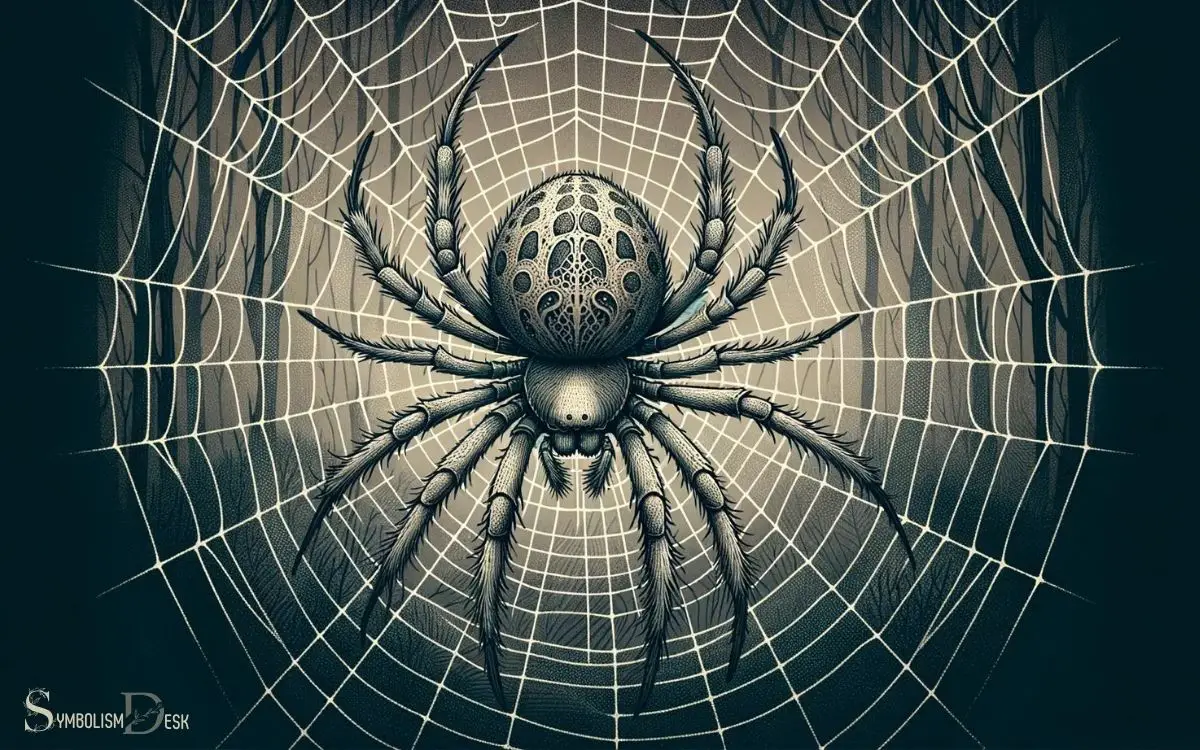What Is the Symbolic Meaning of a Spider? Patience!
The symbolic meaning of a spider encompasses concepts such as creativity, resourcefulness, patience, and sometimes fear or danger.
In various cultures, spiders are seen as powerful figures in folklore and mythology, often associated with the weaving of fate and the threads of life.
Spiders have been symbolic in many cultures for centuries, with their meaning varying:
- Creativity and Artistry: Due to their skill at weaving intricate webs.
- Patience: They wait patiently for their prey.
- Resourcefulness: Spiders are able to thrive in many environments.
- Protection: Webs are often seen as a protective barrier.
- Fear: Arachnophobia is common, and spiders can represent danger or the unknown.
In Native American cultures, the spider is often seen as a totem of creativity and a guide. In West African and Caribbean folklore, Anansi the spider is a trickster god. In European legends, spiders can be omens of good fortune or indicators of future prosperity.
Spiders, revered for their web-weaving, are symbols of life’s complex interconnectivity and the delicate balance of nature.

Key Takeaway
Origins of Spider Symbolism
The symbolic meaning of a spider has its origins in ancient cultures and belief systems. It reflects the spider’s role as a symbol of creativity and creation.
In many ancient societies, the spider was revered for its ability to create intricate webs, which were seen as a representation of the creative process.
For example, in certain Native American traditions, the spider is considered a symbol of storytelling and weaving the fabric of existence. Similarly, in African mythology, Anansi the spider is a well-known figure representing wisdom and storytelling.
Across different cultures, the spider’s ability to spin intricate webs has been associated with the weaving of destiny and the interconnectedness of all things.
This universal symbolism has persisted through the ages, shaping the spider’s significance as a powerful symbol of creativity and creation.
Spider Symbolism in Mythology
Spider symbolism in mythology intertwines with ancient cultural beliefs, portraying the spider as a powerful emblem of creativity and creation across various civilizations.
In many ancient societies, spiders were associated with the weaving of the cosmos and the creation of the world.
In Greek mythology, the story of Arachne depicts a mortal weaver who challenged the goddess Athena and was transformed into a spider, symbolizing the connection between weaving and creation.
Similarly, in African and Native American folklore, spiders are often depicted as wise and cunning creatures responsible for shaping the world.
The Navajo people, for example, tell stories of Spider Woman who taught them how to weave and create beautiful designs.
These myths highlight the spider’s significance as a symbol of ingenuity, resourcefulness, and the creative forces that shape the world.
The Spider as a Symbol of Creativity
Symbolism in mythology intertwines the spider with ancient cultural beliefs, portraying it as a powerful emblem of creativity and creation across various civilizations.
The spider’s symbolic association with creativity is rooted in its ability to craft intricate webs, reflecting the imaginative and artistic potential within all of us.
The spider serves as a symbol of creativity in the following ways:
- Weaving intricate webs that represent the interconnectedness of creative ideas.
- Demonstrating patience and precision in constructing its web, highlighting the dedication required for creative endeavors.
- Embodying adaptability by adjusting its web-building techniques to different environments, symbolizing the flexibility necessary for creative problem-solving.
- Inspiring awe and wonder through the beauty and complexity of its webs, evoking the emotional aspects of the creative process.
This representation of the spider as a symbol of creativity transcends cultural boundaries, resonating with diverse societies and their appreciation for imaginative expression.
Transitioning into the subsequent section about the spider’s symbolic significance in different cultures, one can explore how this universal symbolism manifests uniquely in various ancient and modern belief systems.
The Spider’s Symbolic Significance in Different Cultures
Across different cultures, the spider holds diverse symbolic significance, reflecting varying beliefs and interpretations.
In some cultures, such as in ancient Egypt, the spider was associated with the goddess Neith, who was a spinner and weaver of destiny. This connected the spider to creation, fate, and the divine feminine.
In Native American cultures, the spider is often seen as a symbol of creativity and storytelling, as exemplified by the Navajo story of Spider Woman.
Additionally, in African and Caribbean folklore, the spider is often portrayed as a trickster figure, representing both cunning and wisdom.
These varied interpretations highlight the spider’s ability to embody different meanings across different societies, enriching its symbolic significance.
Understanding these cultural differences can provide deeper insight into the diverse interpretations of spider symbolism.
This understanding paves the way for interpreting fear and protection in spider symbolism.
Are the Symbolic Meanings of a Spider and a Praying Mantis Similar in Any Way?
The symbolic meaning of praying mantis holds a lot of significance in various cultures, symbolizing attributes like stillness, patience, and balance. Similarly, the spider also carries symbolic meanings of creativity, independence, and resourcefulness in different cultures, showing some similarities in their symbolic representations.
Interpreting Fear and Protection in Spider Symbolism
Continuing from the previous subtopic, commonly across various cultures, the symbolic interpretation of spiders in connection to fear and protection varies significantly.
In some cultures, spiders are associated with fear and danger, representing the unknown and unseen threats that lurk in the shadows. However, in other cultures, spiders are seen as protectors, weaving intricate webs that symbolize safety and security.
The interpretation of fear and protection in spider symbolism can also be influenced by personal experiences and beliefs, leading to a diverse range of perspectives.
It’s important to consider the context and cultural background when exploring the symbolic meaning of spiders in relation to fear and protection.
- Spiders as symbols of fear and danger
- Spiders as protectors and weavers of safety
- Personal and cultural influences on spider symbolism
- Context and cultural background in interpreting spider symbolism
Conclusion
The symbolic meaning of a spider is rich and varied. It represents creativity, patience, and protection in different cultures and mythologies. In Native American symbolism, the spider is seen as a symbol of a mother figure who weaves the web of life and provides protection for her offspring. In some African cultures, the spider is associated with wisdom and cunning, as well as the ability to navigate complex situations. Furthermore, exploring praying mantis symbolism reveals its association with stillness, patience, and focus, as well as spiritual insight and awareness. Both the spider and the praying mantis carry deep symbolic meanings that have been passed down through generations.
While some may feel a sense of fear towards spiders, their symbolism also conveys a message of protection and resourcefulness.
So next time you spot a spider, remember that it’s not just a creepy crawly, but a symbol of creativity and strength.






